VIU Global Challenges Initiatives
June 10 - 14, 2019
Leading Universities
Boston College (Prof. Elizabeth Wallace)
Ca’ Foscari University of Venice (Prof. Shaul Bassi)
Tel Aviv University (Prof. Dorit Tanay)
Under the ever-increasing likelihood of global climate change and resulting political instabilities, what can and should be the role of the Humanities and humanistic discourses? It might seem that scientists and social scientists are best positioned to intervene in the massive social, political, and economic transformations that are likely to occur. Yet surely humanists—with their capacity to enable sociable bonds of human connection, to provide historical context, and to explore the very definition of what it means to be human in a material world—also have an important role to play in addressing climate change.
The Program will thus explore “How the Humanities can Help to Save the Planet” by bringing together a number of disciplines within the humanities—literature, philosophy, history, art, music, and so on—that evince a keen commitment to tackling the full range of challenges brought on by catastrophic climate change.
Methodology
The one-week seminar is conceived as a series of morning lectures by participating faculty. Short background readings will be assigned in advance in preparation for the lectures. Discussion will follow the morning lectures.
The afternoon will feature small working groups dedicated to the creation of position papers both articulating specific questions and proposing the kinds of curricular materials that would serve to answer the questions.
Venice itself offers a case study in an imperiled location. Because the seminar will take place during the 2019 Biennale of Art, we also plan to make use of the many unique artistic opportunities available in the city at the time.
Topics
- discovering alternative worlds in the Middle Ages.
- human versus divine imagination
- breakthrough of the new science.
- the role of imagination in the early modern period.
- imagination as a tool for solving problems in early modern Europe
- scientific paradigms in historical perspective
- materialist vitalism
- materialism and agentic capacity
- new materialist approaches to the environment
- humanism and environmentalism
- climate change and the imagination
- fiction and climate change
- environmentalism and time
- environmentalism and social justice
- post humanism
- pedagogies for environmental action
- contemporary art and the environment
Learning outcomes for participants
- access to new ways to integrate a range of humanistic thoughts into their work. For some students, this might possibly mean new directions in research and publication. For others, it may mean sharpening an existing research agenda.
- the development of curricular materials to be deployed in a variety of settings.
Level of students and suitable fields of study
This Graduate seminar is offered to both Master’s students and young researchers early in their PhD, from any discipline.
Fees & Grant Support
Students from the VIU member institutions will pay no participation fees. Grant support is also available to contribute, partially or fully, to the costs of international travel and accommodation on campus in shared rooms. Students from non-member institutions will pay fees and are not eligible for VIU grant support.
For further information
summerschools@univiu.org




























